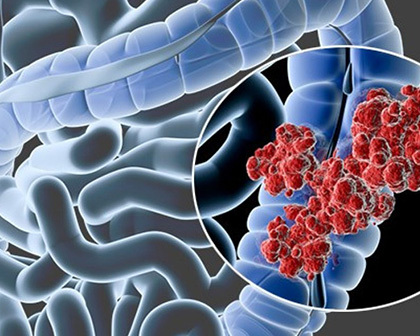Findings demonstrate how two cancer-related genes interact to spur metastasis and potentially enhance immune checkpoint blockade treatment
MD Anderson News Release March 21, 2019
Researchers at The University of Texas MD Anderson Cancer Center revealed the common oncogene KRAS as a possible explanation for why many patients with metastatic colorectal cancer (CRC) do not respond to immune checkpoint blockade (ICB) therapy.
Findings from the study, published in the March 21 online issue of Cancer Cell, shows how KRAS, a key mutation in colorectal cancer, promotes metastasis by controlling the immune-suppressive capabilities of the tumor microenvironment. The study results reveals how KRAS and its downstream target genes interact, supporting further study of a new approach to enhancing ICB therapy.
CRC is a major cause of cancer mortality worldwide. Approximately 20 percent of patients have metastatic disease at the time of diagnosis, and, despite improvements in treatments, approximately 12 percent of patients survive to five years. The quest for new effective treatments or improvements to standard-of-care therapies is crucial.
“The majority of colorectal cancer patients do not respond to immune checkpoint blockade therapy, motivating the need for study of mechanisms and combination regimens with targeted therapies and ICB,” said Ronald A. DePinho, M.D., professor of Cancer Biology. “Our study established an essential role for KRAS in modulating immune microenvironment and primary ICB resistance in advanced CRC.”
Using a genetically engineered mouse model, DePinho’s team demonstrated how a KRAS-regulated gene called interferon regulatory factor 2 (IRF2) drives immune suppression and immune therapy resistance in CRC. They showed that KRAS dampened IRF2 expression, which in turn, resulted in high expression of a protein-encoding gene called C-X-C motif chemokine ligand 3 (CXCL3). CXCL3 binds to its receptor, CXCR2, which is found on myeloid-derived suppressor cells (MDSC) that promote immune suppression and metastasis. The researchers found that restoration of IRF2 expression, or therapeutic inhibition of MDSC by targeting CXCL3-CXCR2 signaling, increased CRC sensitivity to ICB therapy.
“This KRAS-IRF2-CXCL2-CXCR3 axis provides a framework for determining which patients may respond better to ICB, and potentially identifying combination therapy to enhance ICB therapy effectiveness,” said DePinho. “It remains possible that KRAS mutation status in metastatic CRC could be a predictor of ICB resistance when mediated by IRF2 suppression. Our studies suggest the use of combination CXCR2 inhibitor with ICB therapy in patients with advanced CRC who do not respond to today’s standard of care immunotherapy.”
MD Anderson study team participants included Wenting Liao, Ph.D.; Adam Boutin, Ph.D.; Xiaoying Shang, Ph.D.; Di Zhao, Ph.D.; Prasenjit Dey,, Ph.D.; Jiexi Li; Guocan Wang, M.D., Ph.D.; Zhengdao Lan; Shan Jian, Ph.D.; Xingdi Ma; Peiwen Chen, Ph.D.; Deepavali Chakravarti, Ph.D.; Andrew Chang; Denise Spring, Ph.D.; and Y. Alan Wang, Ph.D., all of the Department of Cancer Biology; Jun Li, Ph.D.; Ming Tang, M.D., Ph.D.; and Jianhua Zhang, Ph.D., of the Department of Genomic Medicine; Riham Katkhuda, M.D.; and Dipen Maru, M.D., of the Department of Pathology; Michael Overman, M.D.; Krittiya Korphaisarn, M.D.; and Scott Kopetz M.D., Ph.D., of the Department of Gastrointestinal Medical Oncology; and Qing Chang, M.D., of the Institute for Applied Cancer Science.
Other participating institutions included Southern Medical University, Guangzhou, China; and Syntrix Pharmaceuticals, Auburn, Wash.
A full disclosure of conflicts of interest can be found with the full study.
The study was funded by the National Institutes of Health (CA084628 and 01 CA117969); the National Basic Research Program of China (2015CB554002); the National Natural Science Foundation of China (81672886, 81773101, and 81872401); and the Cancer Prevention and Research Institute of Texas (RP170067). The study was also supported with funding from the Colorectal Cancer Moon Shot™, part of MD Anderson’s Moon Shots Program™, a collaborative effort to accelerate the development of scientific discoveries into clinical advances that save patients’ lives.
